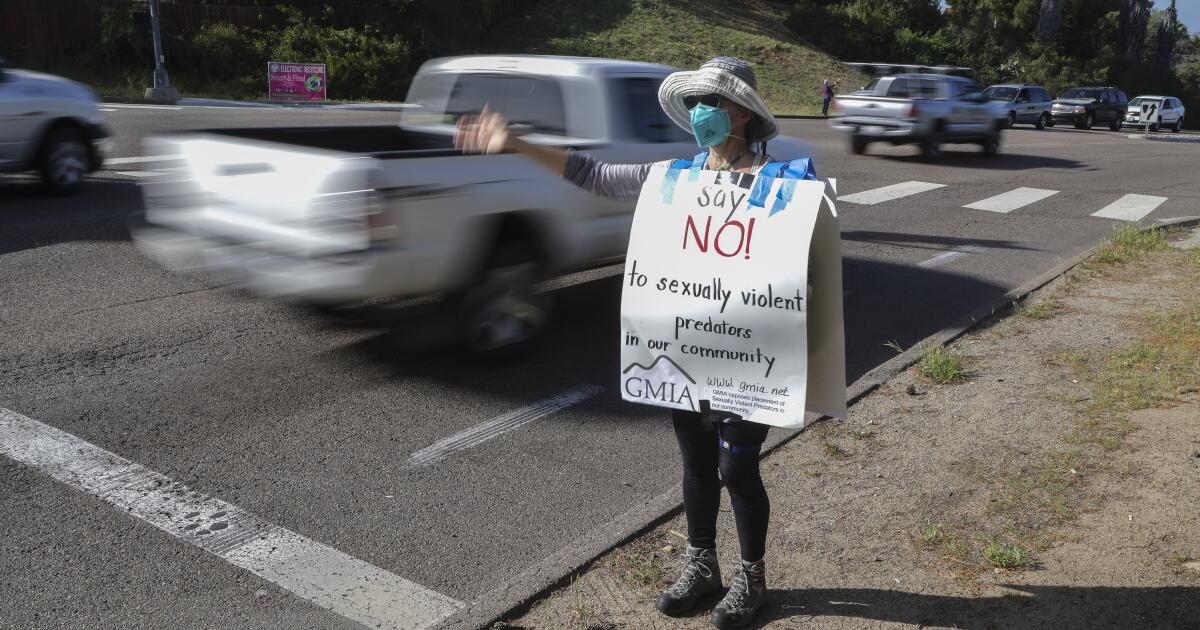
Sarah Thompson was watching the news in 2021 when she learned Douglas Badger, a sexually violent predator, was going to be placed in Mount Helix. In a residence three houses away from hers.
“I was filled with anxiety. Terror,” Thompson said. “How was I going to explain to my 8-year-old son that he can’t play in the cul-de-sac with his friends anymore? It changed everybody’s life.”
Thompson and her La Mesa-area neighbors rallied against Badger’s placement, and he was eventually placed in another San Diego community. Since then, Thompson, with Kids Safe California, has opposed placements of sexually violent predators up and down the state. She said it’s an uphill battle and hopes new legislation being proposed by Rep. Darrell Issa will help.
The 48th District’s congressmember — who represents much of East County — introduced the Stopping Sexually Violent Predators Act at a news conference in front of Poway’s City Hall on Friday.
The bill makes changes to an existing law — the Adam Walsh Child Protection and Safety Act — and, if passed, would effectively ban the placement of sexually violent predators by prohibiting states from spending federal taxpayer dollars on people with that designation outside of a correctional or secure medical facility.

Rep. Darrell Issa speaks in Mission Valley in 2020.
(Nelvin C. Cepeda/The San Diego Union-Tribune)
Most, if not all, sexually violent predators receive federally funded medical care, and by limiting where states can administer that care, the law makes it much less likely, if not impossible, for placements in communities to be made.
The new law would also require states to send a list of convicted sexually violent predators to the Department of Justice for review of potential federal charges.
Flanked by local politicians and more than a dozen residents, Issa said if his communities were sure all sexually violent predators were in secure clinical facilities, “we would all sleep better at night knowing they’re getting the care they need and we’re getting protection … from their urges.”
The sexually violent predator designation is reserved for less than 1 percent of the state’s sexual offender population.
State law allows sexually violent predators to be confined indefinitely in a state hospital after they’ve served their prison terms. While at the hospital, they have the option of participating in a years-long treatment program aimed at curbing their criminal urges.
If successful in the program, they can ask the court to release them to live in the community under supervision by the state’s contractor, Liberty Healthcare, so long as they continue outpatient treatment and follow court-ordered rules.
Since 1996, more than two dozen sexually violent predators — a rare distinction for someone who has committed violent sex crimes and been diagnosed with a condition that could cause them to reoffend — have been placed in San Diego County. Currently, seven sexually violent predators live in the region, with three more awaiting placement.
Among them is Badger, who was convicted of crimes that included child molestation, kidnapping and forced oral copulation. After Thompson and her community rallied against his placement in Mt. Helix, he was sent to live in a Borrego Springs home.
Issa said Friday there are 11 sexually violent predators in his district, which includes parts of Riverside County.
The congressmember noted that these placements often place an undue burden on rural communities, where housing for sexually violent predators may be more easily located. Over the years, these placements have roiled communities and led residents like Thompson to band together in an effort to make it more difficult to place sexually violent predators near their homes.
But it can be hard to know how to oppose placement decisions, she said Friday.
“You don’t know what to do or who to turn to,” Thompson said.
Issa is the fourth local politician to try and change how sexually violent predators are placed in communities this year.
In January, county Supervisors Jim Desmond and Joel Anderson pressed the state to create legislation that would have barred placement of sexually violent predators near public or private schools, including homeschool sites.
A month later, Sen. Brian Jones, who represents the 40th Senate District, introduced Senate Bill 832, which would have prohibited the placement of a sexually violent predator within 5 miles of federal lands, including Native American reservations. In April, it died in committee.
As of July, there are 61 sexually violent predators from San Diego County who are committed to a state hospital or to the conditional release program, according to a District Attorney’s Office website.







